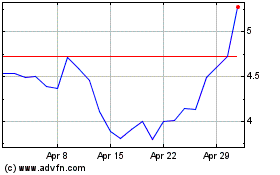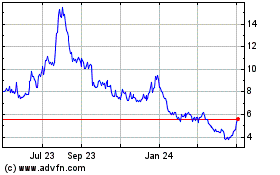UPDATE: Report Of Iran Oil Cut To Europe Lifts Oil Prices
February 15 2012 - 4:48PM
Dow Jones News
A report Wednesday from an Iranian state television
broadcaster--later denied by the Iranian government--saying Tehran
had cut its oil exports to six European nations lifted European oil
prices Wednesday, exposing oil markets' nervousness over any abrupt
Iranian oil disruption.
The report was the latest from Iran to shock oil markets after
the country's threats to close the Strait of Hormuz had sent oil
prices higher in recent weeks. The strait is a strategic Persian
Gulf shipping artery through which a fifth of world oil supplies
are transported.
The Iranian broadcaster Press TV said on its website: "In
response to the latest sanctions imposed by the EU against Iran's
energy and banking sectors, the Islamic Republic has cut oil
exports to six European countries," naming France, the Netherlands,
Spain, Italy, Portugal and Greece as targets of the measure.
Although Portugal buys no oil from Tehran, the five other
countries have been among the EU's largest importers of Iranian
oil, together receiving 659,000 barrels a day in September,
according to data from Eurostat, the EU statistics service.
Some companies, such as France's largest oil company, Total SA
(TOT, FP.FR), have since stopped buying or shipping oil from
Tehran. Royal Dutch Shell PLC (RDSA.LN, RDSA, RDSB.LN, RDSB)
declined to comment on the report and BP PLC (BP, BP.LN) couldn't
immediately be reached for comment.
The International Energy Agency, which coordinates energy policy
for industrialized nations in the Organization for Economic
Cooperation and Development, declined to comment on the Iranian
reports and oil-price moves.
The Press TV report lifted the European benchmark Brent crude
price on ICE Futures Europe as high as $119.99 a barrel during the
session to a six-month intraday high.
Oil prices eased somewhat after an Iranian oil-ministry
spokesman and an Iranian diplomat in charge of Western Europe
denied the Press TV report to separate news agencies. Still, the
Brent contract ended the session at $118.93, an eight-month settle
high.
Italy's foreign minister, Giulio Terzi, denied that Iranian oil
exports to Italy have been halted.
Iranian oil officials and an Iranian diplomat in one of the six
European countries Wednesday also told Dow Jones Newswires they
hadn't received any official notification about a decision to cut
oil exports.
"If there had been a decision, we would have been aware," the
diplomat said.
Despite the denials, subsequent reports suggested a preemptive
embargo still could be in the cards. The Mehr agency quoted an
unnamed Iranian oil official as saying Italy, Spain, Portugal and
Greece were given an ultimatum to extend their long-term contracts
or get their supply cut.
So far, Iran has reacted defiantly to Europe's planned embargo,
saying it could easily find new customers. The National Iranian Oil
Co. has raised the price of its oil for European customers, even as
stronger sanctions make it increasingly difficult to purchase its
crude, a person who had seen the Iranian oil official selling
prices told Dow Jones Newswires Wednesday.
Iranian lawmakers and the country's oil minister have previously
threatened to abruptly interrupt oil exports to some European Union
countries in response to a full EU embargo, which is due to come
into force July 1.
A top Iranian lawmaker had said Tuesday on the Iranian
parliament's website the preemptive ban was still under
consideration, though there was a consensus to implement it.
Even though it has been denied, the Iranian Press TV report
comes during increasing tensions in the Middle East.
Iran's President Mahmoud Ahmadinejad Wednesday unveiled further
progress on its nuclear reactor, though Iran has denied western
claims that it is building atomic weapons and has said the program
is peaceful.
Iran has been accused of bomb blasts this week in Bangkok and
New Delhi, while Israel has warned it could seek to destroy Iran's
nuclear facilities.
Elsewhere, some unrest in large oil-producing nations such as
Saudi Arabia and Nigeria also unsettled oil markets.
"There is little doubt that the increase in tensions in these
regions accompanies an increase in the risk of disruption to oil
supplies," U.S. bank J.P. Morgan said Wednesday in a note.
-By Benoit Faucon, Dow Jones Newswires; +44 77 601 777 36;
benoit.faucon@dowjones.com
--James Herron, Alexis Flynn, Sarah Kent and Selina Williams in
London, Patricia Kowsmann in Lisbon and Liam Moloney in Rome
contributed to this article.
NIO (NYSE:NIO)
Historical Stock Chart
From Jun 2024 to Jul 2024

NIO (NYSE:NIO)
Historical Stock Chart
From Jul 2023 to Jul 2024
